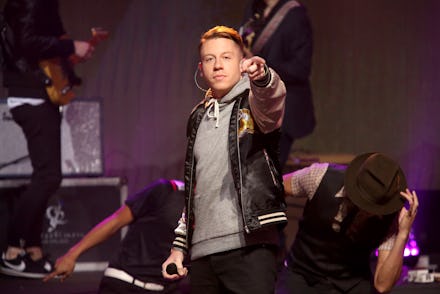Yes, It’s OK to Like Macklemore’s New Song About White Privilege

On Thursday night Grammy-winning rapper Macklemore released a new song with producer Ryan Lewis called "White Privilege II." The nearly nine-minute track is a searing self-indictment about being white at a moment in which black people are quite literally calling for the world to value their lives.
The song, like most things Macklemore does nowadays, has gotten mixed reviews. On one hand, its length is the very epitome of a white man taking up space to talk about himself.
On the other hand, who better to talk to other white folks about activism in this political moment than white artists who can do it so openly, honestly and beautifully? Say what you will about the duo's 2014 reign at the Grammy's over Kendrick Lamar's Good Kid, M.A.A.D. City; Ryan Lewis is a beast of a producer.
But how did the phrase "white privilege" work its way into the American lexicon? As far back as the 1930s, African-American scholar "W.E.B. Du Bois wrote about the 'psychological wage' that allowed poor whites to feel superior to poor blacks," according to Joshua Rothman at the New Yorker. In the 1960s, black activists like Stokely Carmichael brought up the phrase's corollary, white supremacy, to explain the institutional forces that kept black people at the bottom of the pecking order.
It wasn't until 1988 — when Peggy McIntosh, former associate director of the Wellesley Centers for Women, published an academic article called "White Privilege and Male Privilege: A Personal Account of Coming to See Correspondences Through Work in Women's Studies" — that the phrase "white privilege" became an actual thing, Rothman wrote. In it, McIntosh gave a name to the unearned advantages of being born white in the United States. Then she described them.
Arguably more important was the worksheet that McIntosh published inside the article that guided people in, as she called it, "unpacking the invisible knapsack." Examples included everything from finances ("If I should need to move, I can be pretty sure of renting or purchasing housing in an area which I can afford and in which I would want to live.") to table manners ("I can talk with my mouth full and not have people put this down to my color."). This was white privilege in action.
In the nearly three decades since that article was published, discussions of white privilege have become standard on most college campuses and in activist circles. There's a national conference about it. It's even gone mainstream, with Jon Stewart debating Bill O'Reilly about whether it actually exists. Discussions of white privilege have become so common that it's fair to argue whether, like the word "diversity," the phrase has lost its meaning altogether.
Then this week happened. On Monday Campaign Zero activist DeRay McKesson visited Stephen Colbert and took the term to late night television.
And then there's Macklemore, who's been rapping about white privilege for over a decade. Thursday's song was a sequel to the 2005 song of the same name on the rapper's solo album, The Language of My World.
Source: SoundCloud
Back then, Macklemore was still an underground Seattle rapper. His platform wasn't as big, and he didn't yet embody some of hip-hop's deepest insecurities: that a white man could speak to other white people about being white and still have it meaningfully described as rap everybody else could get down with, and that he could do that without inadvertently silencing the voices of artists of color, who'd already been trying to talk about white privilege for decades.
Now Macklemore's message is even more relevant, even if it's grating to some listeners. He wonders aloud about his place at political protests, about the white parents who tell him that his is the only rap music they let their kids listen to. This might not do a damn thing for people forced into those same streets to protest for their survival, but it could do everything for other people: white people, apathetic people, people who think that black men being killed on anonymous streets in cities far away from theirs has nothing to do with them.
Much like Colbert, who learned how to leverage his platform to help people who don't have one, Macklemore is trying — not perfectly — to do the same. Sure, he calls out Miley Cyrus and Iggy Azalea, but even more crucially, he gives a stage to a phenomenal new talent.
Jamila Woods is a Chicago-based singer who just signed to an indie label named Closed Sessions and released a track called "Blk Girl Soldier," which was itself inspired by a protest chant by young Windy City activists. Woods name-drops the likes of exiled political activist Assata Shakur and lesbian poet Audre Lorde on the track.
"I'm interested in figuring out what freedom songs would sound like in 2016," Woods said in a statement, Billboard reported. "My hope is that 'Blk Girl Soldier' is a freedom song for black women today who are fighting the macro- and microaggressions of daily life in our city/country/world."
Whatever you think of Macklemore, it's pretty incredible that in one week, the white host of a historic late night television program and a white Grammy-winning artist are interrogating, publicly, what it means to be white. It's a conversation that's long overdue.